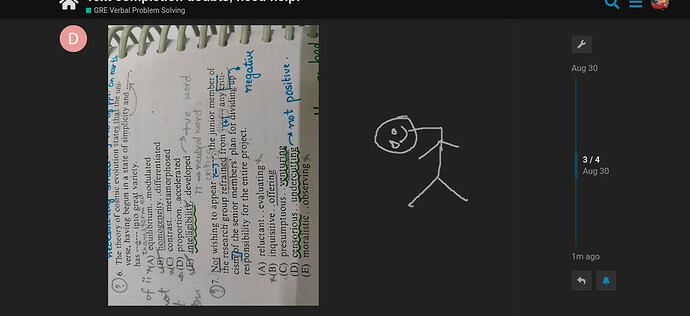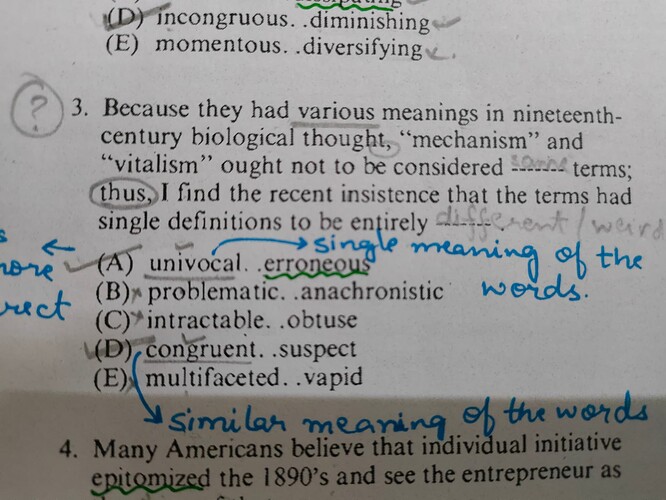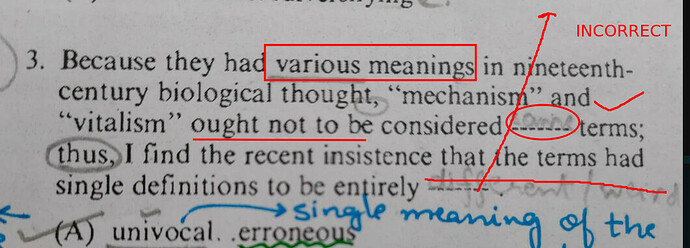Hey guys. Wanting some insight or reasoning in a couple of questions from GRE big book test 1. Section 4- Question 6 and 7.
For Question 6, I was confused between B and E.
For Question 7, I just didn’t know how to go about it.
you can share the screenshot of the questions, along with your reasoning on why you choose the certain option as the correct answer, this way it will be easier to pinpoint the error
So here in 6th question intelligibility and developed can also be used right. As simplicity and clarity go hand in hand. And for second blank when I did not look at the options I used transformed which is similar to developed.
For 7th one I reused critical in the first blank as there is a coma that supports idea 1 and 2. So not and refrained are the same so critical can be used in blank one. So right away I went to choose censorious.
Please don’t break my neck by positing 90 tilt screenshots
Q6
The question is discussing the theory of cosmic evolution, which describes the development of the universe from its initial state to its current complexity. In this context, the words “intelligibility” and “developed” do not accurately convey the scientific concepts being discussed. “Intelligibility” refers to the ability to be understood, while “developed” implies a process of growth or advancement. These words do not accurately reflect the scientific terminology used in the theory of cosmic evolution, which describes the universe as having begun in a state of simplicity and homogeneity and having differentiated into great variety.
Q7
You are correct that the two blanks in the sentence should be filled with words that convey similar ideas, as indicated by the use of “not” and “refrained from.
A. “Reluctant” and “evaluating” do not fit well in the blanks because they do not convey a similar idea. The word “reluctant” means unwilling or hesitant, while “evaluating” means to judge or assess. These words do not convey a similar idea and do not fit well with the context of the sentence.
B. “Inquisitive” and “offering” do not fit well in the blanks because they do not convey a similar idea. The word “inquisitive” means curious or eager for knowledge, while “offering” means to present or provide. These words do not convey a similar idea and do not fit well with the context of the sentence.
C. “Presumptuous” and “venturing” fit well in the blanks because they convey a similar idea. The word “presumptuous” means overstepping due bounds, taking liberties, or being bold and forward, while “venturing” means to proceed despite the risk of danger. These words convey a similar idea and fit well with the context of the sentence.
D. “Censorious” and “undercutting” do not fit well in the blanks because they do not convey a similar idea. The word “censorious” means severely critical or faultfinding, while “undercutting” means to undermine or weaken. These words do not convey a similar idea and do not fit well with the context of the sentence.
E. “Moralistic” and “observing” do not fit well in the blanks because they do not convey a similar idea. The word “moralistic” means characterized by a narrow and conventional moral attitude, while “observing” means to watch carefully or to notice. These words do not convey a similar idea and do not fit well with the context of the sentence.
Hi in this question why are we choosing univocal over congruent? Also for blank 2 suspect made more sense to me than erroneous because the sentence is talking about someone’s opinion so saying that ‘2 words having same meaning currently is wrong’ is too strong.



